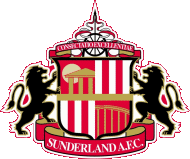
SUNDERLAND A.F.C.
Founded: 1879
Also Known As:
SUNDERLAND & District Teachers (1879)
SUNDERLAND AFC (1880-)
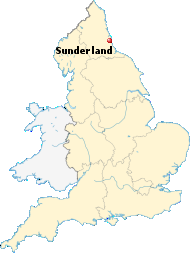
CLICK ON THE MAP TO
VIEW ENLARGED MAP
|
SUNDERLAND A.F.C. (Association Football Club)
Included Info: Brief History, Club/Stadium Info, Team Jersey & Much More...
BRIEF HISTORY of SUNDERLAND FOOTBALL CLUB
(reproduced from 'Wikipedia' pages)
Founded in 1879 as 'Sunderland and District Teachers A.F.C.' by schoolmaster James Allan, Sunderland joined The
Football League for the 189091 season. They replaced Stoke, who had failed to be re-elected, becoming the first
new club to join the league since its inauguration in 1888. Sunderland won the league championship in the 189192
season, one season after joining The Football League. Sunderland came close to winning a third successive league
championship in the 189394 season, finishing second behind Aston Villa. However, they regained the title in the
189495 season, ending the season five points ahead of Everton. After winning the English League Championship,
Sunderland played against Heart of Midlothian, the champions of the Scottish League, in a game described as the
Championship of the World title match. Sunderland won the game 53 and were announced "Champions of the world".
Sunderland came close to winning another league title in the 189798 season, when they finished as runners-up to
Sheffield United. That season was their last at Newcastle Road, as they moved to Roker Park the following season.
After coming second in 190001, the club won their fourth league title in the 190102 season, beating Everton by
a three-point margin. On 5 December 1908, Sunderland achieved their highest ever league win, against north-east
rivals Newcastle United. They won the game 91. The club won the league again in 1913, but lost their first FA Cup
final 10 to Aston Villa, in a very tough loss. Two seasons later the First World War brought the league to a halt.
After the league's resumption, Sunderland came close to winning another championship in the 192223 season, when
they were runners-up to Liverpool. They also came close the following season, finishing third, four points from
the top of the league. The club escaped relegation from the First Division by one point in the 192728 season
despite 35 goals from Dave Halliday.
The club's sixth league championship came in the 193536 season, and they won the FA Cup the following season,
after a 31 victory against Preston North End at Wembley Stadium. The remainder of the decade saw mid-table finishes,
until the league and FA Cup were suspended for the duration of the Second World War. For Sunderland, the immediate
post-war years were characterised by significant spending; the club paid £18,000 (£555 thousand today) for Carlisle
United's Ivor Broadis in January 1949. Broadis was also Carlisle's manager at the time, and this is the first instance
of a player transferring himself to another club. This, along with record-breaking transfer fees to secure the services
of Len Shackleton and Welsh international Trevor Ford, led to a contemporary nickname, the "Bank of England club".
The club finished third in the First Division in 1950, their highest finish since the 1936 championship. The late
1950s saw a sharp downturn in Sunderland's fortunes, and the club was once again implicated in a major financial
scandal in 1957. Found guilty of making payments to players in excess of the maximum wage, they were fined £5,000
(£105,000 today), and their chairman and three directors were suspended. The following year, Sunderland were relegated
from the highest division for the first time in their 68-year league history. Sunderland's absence from the top flight
lasted six years. The club came within one game of promotion back to the First Division in the 196263 season.
After the close call in the previous season, the club was promoted to Division One in 1964 after finishing in
second place. Sunderland beat Charlton Athletic in the final stages of the season, where they clinched promotion
with a game to spare. At the end of the decade, they were again relegated to the Second Division after finishing 21st.
By winning the 1973 FA Cup Final, Sunderland qualified for the UEFA Cup Winners' Cup, the club's only appearance in
European competition to date. Sunderland beat Vasas Budapest 30 on aggregate, and were drawn against Lisbon club
Sporting in the second round. They won the first leg at Roker Park 21 but were defeated 20 in the away leg, and
were knocked out of the competition 32 on aggregate. After spending six seasons in the Second Division, Sunderland
were promoted to Division One in the 197576 season; they topped the table over Bristol City by three points.
However, Sunderland were relegated the following season back into Division Two. Sunderland appeared in their first
League Cup final in 1985, but lost 10 to Norwich City. In 1987, Sunderland saw one of the lowest points in their
history, when they were relegated to the Third Division of the English league for the first time. In 1990, they were
promoted back to the top flight in unusual circumstances. Sunderland lost to Swindon Town in the play-off final,
but Swindon's promotion was revoked after the club was found guilty of financial irregularities and Sunderland were
promoted instead. They stayed up for one year before being relegated on the final day of the following season.
In 1995, they faced the prospect of a return to the third-tier of English football. After promotion from Division
One in the 199596 season, Sunderland began their first season in the Premier League, but finished third from the
bottom and were relegated back to the First Division. In 1997, Sunderland left Roker Park, their home for 99 years.
The club moved to the Stadium of Light, a 42,000-seat arena that, at the time, was the largest stadium built in England
after the Second World War. The capacity was later increased to 49,000.
Sunderland returned to the Premier League as First Division champions in 1999 with a then-record 105 points.
Sunderland's 19992000 season started at Stamford Bridge, where Chelsea beat them 40. Another seventh place finish
in the 200001 season was followed by two less successful seasons, and they were relegated to the second-tier with
a then-record low 19 points in 2003. Following Sunderland's relegation from the Premier League, the club was taken
over by the Irish Drumaville Consortium, headed by ex-player Niall Quinn, who appointed former Manchester United
captain Roy Keane as the new manager. Under Keane, the club rose steadily up the table with an unbeaten run of 17
games to win promotion to the Premier League, and were named winners of the Championship after beating Luton Town
50 at Kenilworth Road on 6 May 2007. The club's form in the 200708 season was better than during their last season
in the Premier League, as they finished 15th with 39 points. After a run of one draw and four defeats in the opening
five league games of the 201314 season, Gus Poyet was announced as a new replacement for manager on 8 October 2013.
Despite Sunderland losing 40 at Swansea in his first game in charge, Poyet brought a turnaround in Sunderland 's
fortunes as they brought their way back into contention for survival with wins against Newcastle, Manchester City
and Everton, before thrashing Fulham 41 (with Adam Johnson scoring the first hat trick from a Sunderland player
since 2010). Poyet also led Sunderland to the Capital One Cup final against Manchester City after a dramatic penalty
shootout win at Manchester United in the semi-final. Sunderland were defeated 31 by City in the final.
|
CLUB FACTS & INFORMATION
| Official Name
| --
| Sunderland A.F.C. |
| Club Nickname
| --
| The Black Cats |
| Year Founded
| --
| 1879 (138 years ago) |
| English County
| --
| Tyne and Wear |
| Current Ground
| --
| Stadium Of Light |
| Ground Location
| --
| Sunderland, England |
| Club's Owner
| --
| Ellis Short |
| Club Chairman
| --
| Ellis Short |
| Current Manager
| --
| Simon Grayson |
| Current League
| --
| Championship |
| Last Season
| --
| Premier League, 20th place
(relegated to Championship) |
HOME COLORS

Red, White & Black |
AWAY COLORS

Green, Darker Green
w/Yellow Trim |
|
| |
INTERESTING STADIUM FACTS & INFORMATION

STADIUM OF LIGHT
Kier Hardy Way, Sunderland,
Tyne and Wear, SR5-1SU, England
OPENED: ......... 1997
SURFACE: ........ Grass
COST: .............. $27 Million
CAPACITY: ...... 49,000
RECORD: ......... 48,353 (2002 vs Liverpool)
OWNER: ........... Sunderland A.F.C
OPERATOR: ..... Sunderland A.F.C
FIELD SIZE: ..... 115 Χ 75 yards (105 x 69 meters)
|
|
|
HOME JERSEY
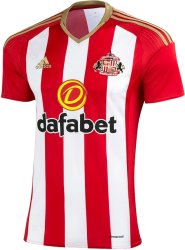 |
AWAY JERSEY
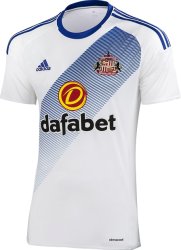 |
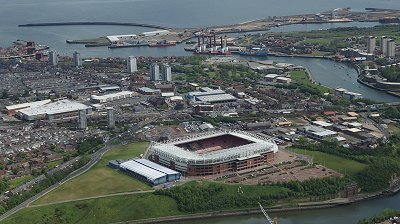
Click On Aerial Photo To View/Download Enlarged Image
|
Stadium of Light (Sunderland) Seating Diagram
Click On Diagram Below To Enlarge View
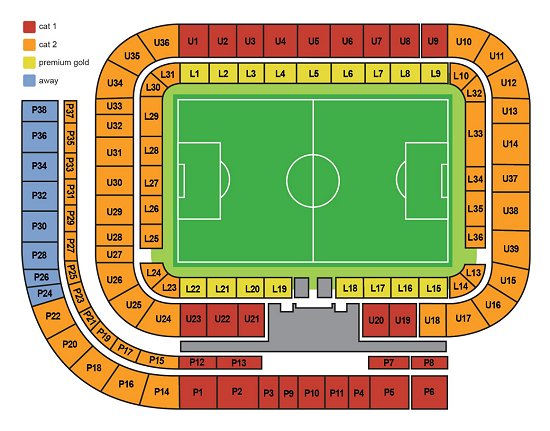
|



SUNDERLAND STADIUM WALLPAPERS (Free Download)
Wallpaper Size below is 800x600: To Download Bigger Sizes, Click On Any Button Shown Above
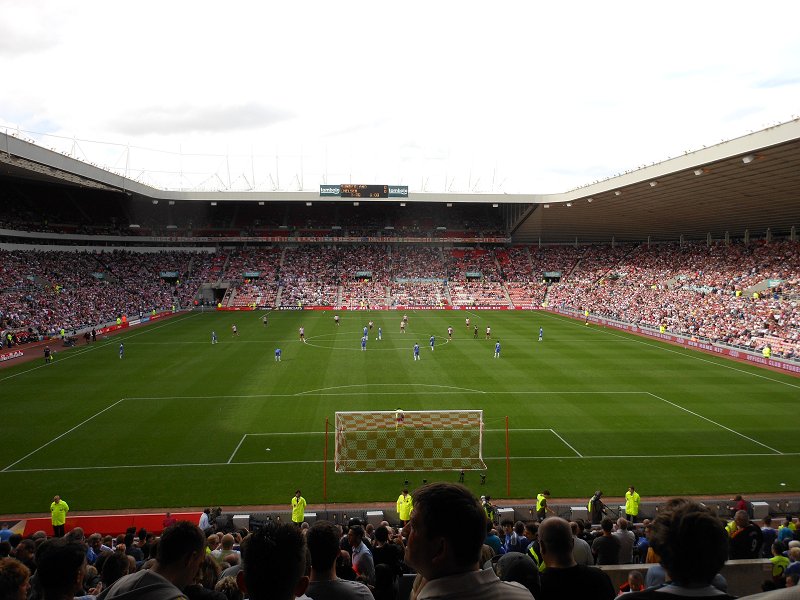
|
|

